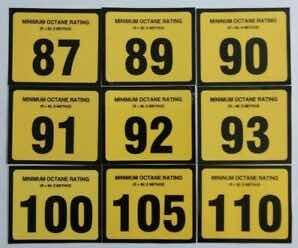The Low-Down on High Octane Gasoline
Posted by Timothy Haves on Jan 10, 2012 in Blog | Comments Off on The Low-Down on High Octane GasolineAre you tempted to buy a high octane gasoline for your car because you want to improve its performance? If so, take note: the recommended gasoline for most cars is regular octane. In fact, in most cases, using a higher octane gasoline than your owner’s manual recommends offers absolutely no benefit. It won’t make your car perform better, go faster, get better mileage or run cleaner. Your best bet: listen to your owner’s manual.
The only time you might need to switch to a higher octane level is if your car engine knocks when you use the recommended fuel. This happens to a small percentage of cars.
Unless your engine is knocking, buying higher octane gasoline is a waste of money, too. Premium gas costs 15 to 20 cents per gallon more than regular. That can add up to $100 or more a year in extra costs. Studies indicate that altogether, drivers may be spending hundreds of millions of dollars each year for higher octane gas than they need.

What are octane ratings?
Octane ratings measure a gasoline’s ability to resist engine knock, a rattling or pinging sound that results from premature ignition of the compressed fuel-air mixture in one or more cylinders. Most gas stations offer three octane grades: regular (usually 87 octane), mid-grade (usually 89 octane) and premium (usually 92 or 93). The ratings must be posted on bright yellow stickers on each gasoline pump.
What’s the right octane level for your car?
Check your owner’s manual to determine the right octane level for your car. Regular octane is recommended for most cars. However, some cars with high compression engines, like sports cars and certain luxury cars, need mid-grade or premium gasoline to prevent knock.
How can you tell if you’re using the right octane level? Listen to your car’s engine. If it doesn’t knock when you use the recommended octane, you’re using the right grade of gasoline.
Will higher octane gasoline clean your engine better?
As a rule, high octane gasoline does not outperform regular octane in preventing engine deposits from forming, in removing them, or in cleaning your car’s engine. In fact, the U.S. Environmental Protection Agency requires that all octane grades of all brands of gasoline contain engine cleaning detergent additives to protect against the build-up of harmful levels of engine deposits during the expected life of your car.
Should you ever switch to a higher octane gasoline?
A few car engines may knock or ping – even if you use the recommended octane. If this happens, try switching to the next highest octane grade. In many cases, switching to the mid-grade or premium-grade gasoline will eliminate the knock. If the knocking or pinging continues after one or two fill-ups, you may need a tune-up or some other repair. After that work is done, go back to the lowest octane grade at which your engine runs without knocking.
Is knocking harmful?
Occasional light knocking or pinging won’t harm your engine, and doesn’t indicate a need for higher octane. But don’t ignore severe knocking. A heavy or persistent knock can lead to engine damage.
Is all “premium” or “regular” gasoline the same?
The octane rating of gasoline marked “premium” or “regular” is not consistent across the country. One state may require a minimum octane rating of 92 for all premium gasoline, while another may allow 90 octane to be called premium. To make sure you know what you’re buying, check the octane rating on the yellow sticker on the gas pump instead of relying on the name “premium” or “regular.”
For More Information
If you’re concerned about the accuracy of an octane label – or if you don’t see a yellow octane sticker on a gasoline pump, write: Consumer Response Center, Federal Trade Commission, Washington, DC 20580.
The FTC works to prevent fraudulent, deceptive and unfair business practices in the marketplace and to provide information to help consumers spot, stop and avoid them. To file a complaint or get free information on consumer issues, visit ftc.gov or call toll-free, 1-877-FTC-HELP (1-877-382-4357); TTY: 1-866-653-4261. Watch a video, How to File a Complaint, at ftc.gov/video to learn more. The FTC enters consumer complaints into the Consumer Sentinel Network, a secure online database and investigative tool used by hundreds of civil and criminal law enforcement agencies in the U.S. and abroad.
